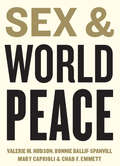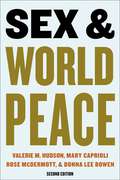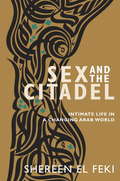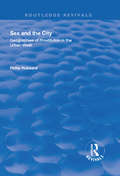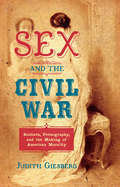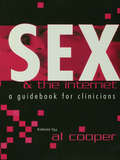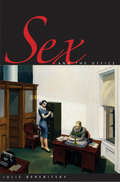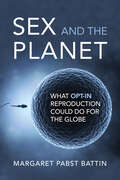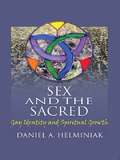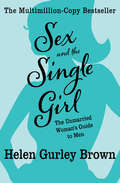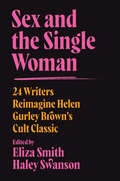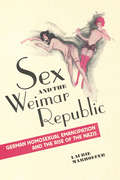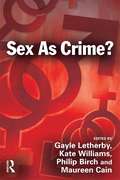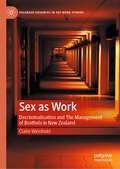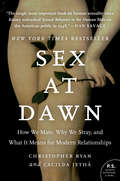- Table View
- List View
Sex and World Peace
by Valerie Hudson Bonnie Ballif-Spanvill Mary Caprioli Chad EmmettSex and World Peace unsettles a variety of assumptions in political and security discourse, demonstrating that the security of women is a vital factor in the security of the state and its incidence of conflict and war. The authors compare micro-level gender violence and macro-level state peacefulness in global settings, supporting their findings with detailed analyses and color maps. Harnessing an immense amount of data, they call attention to discrepancies between national laws protecting women and the enforcement of those laws, and they note the adverse effects on state security of abnormal sex ratios favoring males, the practice of polygamy, and inequitable realities in family law, among other gendered aggressions. The authors find that the treatment of women informs human interaction at all levels of society. Their research challenges conventional definitions of security and democracy and shows that the treatment of gender, played out on the world stage, informs the true clash of civilizations. In terms of resolving these injustices, the authors examine top-down and bottom-up approaches to healing wounds of violence against women, as well as ways to rectify inequalities in family law and the lack of parity in decision-making councils. Emphasizing the importance of an R2PW, or state responsibility to protect women, they mount a solid campaign against women's systemic insecurity, which effectively unravels the security of all.
Sex and World Peace
by Rose McDermott Valerie Hudson Donna Lee Bowen Mary CaprioliSex and World Peace is a groundbreaking demonstration that the security of women is a vital factor in the occurrence of conflict and war, unsettling a wide range of assumptions in political and security discourse. Harnessing an immense amount of data, it relates microlevel violence against women and macrolevel state peacefulness across global settings.The authors find that the treatment of women informs human interaction at all levels of society. They call attention to the adverse effects on state security of sex-based inequities such as sex ratios favoring males, the practice of polygamy, and lax enforcement of national laws protecting women. Their research challenges conventional definitions of security and democracy and common understandings of the causes of world events. The book considers a range of ways to remedy these injustices, including top-down and bottom-up approaches to redressing violence against women and the lack of sex parity in decision-making. Advocating a state responsibility to protect women, the authors campaign against women’s systemic insecurity, which threatens the security of all.Sex and World Peace has been a go-to book for instructors, advocates, and policy makers since its publication in 2012. Since then, there have been major changes in world affairs, including the #MeToo movement, as well as advances in both theoretical and empirical literature surrounding the subject. This second edition, which adds coauthors Rose McDermott and Donna Lee Bowen alongside Valerie M. Hudson and Mary Caprioli, revises and updates the book for a new generation. The book retains its foundational overview of the relationship between women’s oppression and war, enhanced by fresh data and new material covering recent developments for global women’s rights and analysis of additional examples of gender and conflict throughout the world.
Sex and the Brain
by Gillian EinsteinThis collection of foundational papers on sex differences in the brain traces the development of a much-invoked, fast-growing young field at the intersection of brain and behavior. The reader is introduced to the meaning and nature of sexual dimorphisms, the mechanisms and consequences of steroid hormone action, and the impact of the field on interpretations of sexuality and gender. Building on each other in point-counterpoint fashion, the papers tell a fascinating story of an emerging science working out its core assumptions. Experimental and theoretical papers, woven together by editor's introductions, open a window onto knowledge in the making and a vigorous debate between reductionist and pluralist interpreters. Five major sections include papers on conceptual and methodological background, central nervous system dimorphisms, mechanisms for creating dimorphisms, dimorphisms and cognition, and dimorphisms and identity. Each section builds from basic concepts to early experiments, from experimental models to humans, and from molecules to mind. Papers by such leading scholars as Arthur Arnold, Frank Beach, Anne Fausto-Sterling, Patricia Goldman-Rakic, Doreen Kimura, Simon LeVay, Bruce McEwen, Michael Merzenich, Bertram O'Malley, Geoffrey Raisman, and Dick Swaab, illustrate a rich blend of perspectives, approaches, methods, and findings. Sex and the Brainwill show students how a scientific paper can be analyzed from many perspectives, and supply them with critical tools for judging a rapidly emerging science in a contentious area.
Sex and the Citadel: Intimate Life in a Changing Arab World
by Shereen El FekiIn the political unrest that swept across the Arab region in 2011, all eyes were on the streets and squares erupting in protest. But for the past four years, Shereen El Feki has been looking at upheaval a little closer to home -- in the sexual lives of men and women across the Arab world. The result is Sex and the Citadel, an informative, insightful and engaging account of a highly sensitive and still largely secret aspect of Arab society.Sex might seem a strange lens with which to examine change in the Arab world; it is, in fact, a prism with which to refract the region's complex social spectrum. Sexual attitudes and behaviours are intimately bound up in religion, culture, politics and economics. As such, they are not only a reflection of the conditions that led to the recent uprisings, as well as one of the engines of revolt, but will also be a measure of hard-won reforms in the years to come. Sex and the Citadel is no peep show. By linking sexuality to political, economic, social and religious trends, it opens a window on the greater landscape of the Arab world, both for readers new to the region whose interest has been sparked by recent events, and for old hands familiar with the Arab world. Nor is the book an academic treatise: this is a highly personal account, rich with original research and first-person stories, that gives us unprecedented and timely insight into a part of the world that is transforming in front of our very eyes.
Sex and the Citadel: Intimate Life in a Changing Arab World
by Shereen El FekiIf you really want to know a people, start by looking inside their bedrooms. As political change sweeps the streets and squares, the parliaments and presidential palaces of the Arab world, Shereen El Feki has been looking at an upheaval a little closer to home--in the sexual lives of men and women in Egypt and across the region. The result is an informative, insightful, and engaging account of a highly sensitive and still largely secret aspect of Arab society. Sex is entwined in religion, tradition, politics, economics, and culture, so it is the perfect lens through which to examine the complex social landscape of the Arab world. From pregnant virgins to desperate housewives, from fearless activists to religious firebrands, from sex work to same-sex relations, Sex and the Citadel takes a fresh look at the sexual history of the region and brings new voices to the debate over its future. This is no peep show or academic treatise but a highly personal and often humorous account of one woman's journey to better understand Arab society at its most intimate and, in the process, to better understand her own origins. Rich with five years of groundbreaking research, Sex and the Citadel gives us a unique and timely understanding of everyday lives in a part of the world that is changing before our eyes.
Sex and the City
by Candace BushnellA columnist's examination of the celebrity affairs and sexual link indulged in by the members of high society is seen through the experiences of a troubled writer, a mega-businessman, a famous underwear model, and others.
Sex and the City and Us: How Four Single Women Changed the Way We Think, Live, and Love
by Jennifer Keishin ArmstrongThe bestselling author of Seinfeldia offers a fascinating retrospective of the iconic and award-winning television series, Sex and the City, in a &“bubbly, yet fierce cultural dissection of the groundbreaking show&” (Chicago Tribune).This is the story of how a columnist, two gay men, and a writers&’ room full of women used their own poignant, hilarious, and humiliating stories to launch a cultural phenomenon. They endured shock, slut-shaming, and a slew of nasty reviews on their way to eventual—if still often begrudging—respect. The show wasn&’t perfect, but it revolutionized television for women. When Candace Bushnell began writing for the New York Observer, she didn&’t think anyone beyond the Upper East Side would care about her adventures among the Hamptons-hopping media elite. But her struggles with singlehood struck a chord. Beverly Hills, 90210 creator Darren Star brought her vision to an even wider audience when he adapted the column for HBO. Carrie, Miranda, Charlotte, and Samantha launched a barrage of trends, forever branded the actresses that took on the roles, redefined women&’s relationship to sex and elevated the perception of singlehood. Featuring exclusive new interviews with the cast and writers, including star Sarah Jessica Parker, creator Darren Star, executive producer Michael Patrick King, and author Candace Bushnell, &“Jennifer Keishin Armstrong brings readers inside the writers&’ room and into the scribes&’ lives…The writing is fizzy and funny, but she still manages an in-depth look at a show that&’s been analyzed for decades, giving readers a retrospective as enjoyable as a $20 pink cocktail&” (The Washington Post). Sex and the City and Us is both a critical and nostalgic behind-the-scenes look at a television series that changed the way women see themselves.
Sex and the City: Geographies of Prostitution in the Urban West (Routledge Revivals)
by Philip HubbardThis title was first published in 2000: Prostitution has always played a crucial symbolic role in the definition of moral and sexual standards and, as such, the figure of the prostitute has been paradigmatic in the history of the sex and the city. Focusing on the geographies of female prostitution in Western societies, this book explores the nature of sites of sex work and the ways they shape the lives of prostitutes (and their clients). In so doing, the book aims not simply to present a static "mapping" of sex work, but seeks to highlight how these public and private ssites are struggled over, with prostitutes often resisting the strategies of social and legal control designed to regulate their working practices. The book consequently engages with a number of contemporary debates in social, cultural and gender geography surrounding the importance of public and private spaces in producing (and reproducing) gender, sex and bodily identities.
Sex and the Civil War: Soldiers, Pornography, and the Making of American Morality (The Steven and Janice Brose Lectures in the Civil War Era)
by Judith GiesbergCivil War soldiers enjoyed unprecedented access to obscene materials of all sorts, including mass-produced erotic fiction, cartes de visite, playing cards, and stereographs. A perfect storm of antebellum legal, technological, and commercial developments, coupled with the concentration of men fed into armies, created a demand for, and a deluge of, pornography in the military camps. Illicit materials entered in haversacks, through the mail, or from sutlers; soldiers found pornography discarded on the ground, and civilians discovered it in abandoned camps. Though few examples survived the war, these materials raised sharp concerns among reformers and lawmakers, who launched campaigns to combat it. By the war's end, a victorious, resurgent American nation-state sought to assert its moral authority by redefining human relations of the most intimate sort, including the regulation of sex and reproduction—most evident in the Comstock laws, a federal law and a series of state measures outlawing pornography, contraception, and abortion. With this book, Judith Giesberg has written the first serious study of the erotica and pornography that nineteenth-century American soldiers read and shared and links them to the postwar reaction to pornography and to debates about the future of sex and marriage.
Sex and the Family in Colonial India: The Making of Empire
by Durba GhoshIn the early years of the British empire, cohabitation between Indian women and British men was commonplace and to some degree tolerated. However, as Durba Ghosh argues in a challenge to the existing historiography, anxieties about social status, appropriate sexuality, and the question of who could be counted as 'British' or 'Indian' were constant concerns of the colonial government even at this time. By following the stories of a number of mixed-race families, at all levels of the social scale, from high-ranking officials and noblewomen to rank-and-file soldiers and camp followers, and also the activities of indigenous female concubines, mistresses and wives, the author offers a fascinating account of how gender, class and race affected the cultural, social and even political mores of the period. The book makes an original and signal contribution to scholarship on colonialism, gender and sexuality.
Sex and the Internet: A Guide Book for Clinicians
by Al CooperFirst Published in 2002. Routledge is an imprint of Taylor & Francis, an informa company.
Sex and the Married Girl: Heterosexual Marriage and the Body in Postwar Canada (Studies in Gender and History)
by Heather StanleySex – who was having it, who shouldn’t have it, and who was supposed to be having it but wasn’t – was a major concern to social authorities in the immediate postwar era. Though they are often remembered with nostalgia as a sexually simpler time, the 1950s and early 1960s were incredibly sexually productive years. Sex and the Married Girl examines how two interrelated and dominant groups in Canada – medical professionals and church leaders – used married heterosexual female sexuality as a lever to rebuild the Canadian family and the state itself. Using embodied historical methodologies, the book examines not only discourses around sex but also how those discourses could influence the actual experience of sex for married women. Heather Stanley draws upon extensive oral life histories of women who lived, married, and had sex during this liminal social period to demonstrate that this was a time of simultaneous sexual and gender quiescence and change.
Sex and the Office
by Helen Gurley BrownHelen Gurley Brown adds dazzle to dull office days in her follow-up to the phenomenal bestseller Sex and the Single Girl The classic book from 1965 tells what it was really like to be the girl in a Mad Men–style workplace. Sex and the Office became the definitive, comprehensive guide to working life for an entire generation of women. Alongside advice about how to deal with your boss, manage office politics, and make the most of personal and professional opportunities in the office, Helen Gurley Brown also shares stories from her own office days. A classic of its time, this stands as a frank look at how to get ahead, not just through working hard but through playing hard, too.
Sex and the Office
by Julie BerebitskyIn this engaging book—the first to historicize our understanding of sexual harassment in the workplace—Julie Berebitsky explores how Americans’ attitudes toward sexuality and gender in the office have changed since the 1860s, when women first took jobs as clerks in the U. S. Treasury office. Berebitsky recounts the actual experiences of female and male office workers; draws on archival sources ranging from the records of investigators looking for waste in government offices during World War II to the personal papers ofCosmopolitaneditor Helen Gurley Brown andMs. magazine founder Gloria Steinem; and explores how popular sources—including cartoons, advertisements, advice guides, and a wide array of fictional accounts—have represented wanted and unwelcome romantic and sexual advances. This range of evidence and the study’s long scope expose both notable transformations and startling continuities in the interplay of gender, power and desire at work.
Sex and the Planet: What Opt-In Reproduction Could Do for the Globe (Basic Bioethics)
by Margaret Pabst BattinWhat if human reproduction was always elective? A prominent bioethicist speculates about the possibilities—and the likely consequences.What would the world be like if all pregnancy was intended, not unintended as it is nearly half the time now? Considerably better, Margaret Pabst Battin suggests in Sex and the Planet, a provocative thought experiment with far-reaching real-world implications. Many of the world&’s most vexing and seemingly intractable issues begin with sex—when sperm meets egg, as Battin puts it—abortion, adolescent pregnancy, high-risk pregnancy, sexual violence, population growth and decline. Rethinking reproductive rights and exposing our many mistaken assumptions about sex, Sex and the Planet offers an optimistic picture of how we might solve these problems—by drastically curtailing unintended pregnancies using currently available methods.How we see this picture—as recommendation, prediction, utopian fantasy, totalitarian plot, hypothetical conjecture, or realistic solution—depends to a great degree on which of thirteen problematic assumptions we maintain, assumptions Battin works to identify and challenge. Taking on sensitive topics like abortion and rape and religious issues around contraception, she shows how a fully informed, nonideological approach could defuse much of the friction such issues tend to generate. Also, in her attention to male contraception and the asymmetry of female and male reproductive control, she pulls in the 50 percent of the human race—those with Y chromosomes—largely left out of discussions of reproductive health. Sex and the Planet, finally, takes a global view, inviting us to consider a possible—even plausible—reproductive future.
Sex and the Sacred: Gay Identity and Spiritual Growth
by Daniel A HelminiakA down-to-earth look at the spiritual power of sexSex and the Sacred examines the spiritual dimension of human sexuality in a way that is free of religious affiliation but still open to traditional religion and belief in God. Dr. Daniel Helminiak, author of the best-selling What the Bible Really Says about Homosexuality, looks at the relationship between sexuality and spirituality, first, from a humanistic perspective and, then, a more familiar Christian point of view. In particular, he encourages LGBTI people to reclaim their spiritual heritage without apology. This unique book emphasizes spiritual commitment as an essential facet of LGBTI/queer consciousness and addresses such burning themes as coming out, the importance of self-acceptance, gay marriage, gay bashing, and the ethics of gay sex. Sex and the Sacred combines a psychological approach to spirituality with common sense and compassion, inspiring a break from moralistic religion and an understanding of what true spirituality means. The book applies this understanding to Christian topics such as the Bible, Fundamentalism, and the future of Christianity, and shows how coming out was an issue for Jesus, how homosexual experience relates to the Christian Trinity, and how Western Civilization became so sex-negative.Sex and the Sacred presents in the end a radical vision of Christianity open to all people. Religious leaders of all denominations, educators, counselors, members of the gay/lesbian/bisexual/transgender community, non-religious spiritual seekers, and anyone interested in the relationship between spirituality and sexuality will find this book enlightening and uplifting. Sex and the Sacred examines: the spiritual drive that is built into human sexuality the standard religious arguments against gay marriage a sustained argument that Biblical Fundamentalism is not Christian spiritual lessons from the AIDS epidemic the right and wrong of sex-queer and otherwise homosexuality in Catholic teaching and practice sexual ethics without religion a vision for a renewed Christianity within a global community
Sex and the Single Girl: The Unmarried Woman's Guide to Men (Cult Classics Ser. #Vol. 1)
by Helen Gurley BrownThe 1962 blockbuster that took on &“one of the most absurd (if universal) myths of our time: that every girl must be married&” (The New York Times). Helen Gurley Brown, the iconic editor in chief of Cosmopolitan for thirty-two years, is considered one of the most influential figures of Second Wave feminism. Her first book sold millions of copies, became a cultural phenomenon, and ushered in a whole new way of thinking about work, men, and life. Feisty, fun, and totally frank, Sex and the Single Girl offers advice to unmarried women that is as relevant today as it was when it burst onto the scene in the 1960s. This spirited manifesto puts women—and what they want—first. It captures the exuberance, optimism, and independence that have influenced the lives of so many contemporary American women.
Sex and the Single Woman: 24 Writers Reimagine Helen Gurley Brown's Cult Classic
by Haley Swanson Eliza SmithOne of Bustle's Best Books of MayA feminist anthology inspired by legendary Cosmopolitan editor Helen Gurley Brown’s Sex and the Single Girl, featuring twenty-four new essays on the triumphs and heartbreaks of modern singlehood from acclaimed and bestselling authors, including Kristen Arnett, Morgan Parker, Evette Dionne, and Melissa Febos.Sixty years ago, Helen Gurley Brown's Sex and the Single Girl sent shockwaves through the United States, selling more than two million copies in three weeks. Helen’s message was radical for its time: marriage wasn’t essential for women to lead rich, fulfilling lives.Now, in these critical, wry, and expansive essays, twenty-four writers reconsider Helen’s advice and how it applies to their own paths, fielding topics that she couldn’t—or wouldn’t—conceive of in 1962: contraception and abortion (an omission demanded by her publisher), queer and trans womanhood, polyamory, celibacy, interracial dating, bodies of all kinds, consent, sex work, IVF, and the pop culture that both saves and fails us.Eliza Smith and Haley Swanson’s revisionist anthology honors Brown’s irreverent spirit while also validating our modern experiences of singlehood, encouraging us all to reclaim joy where it’s so often been denied.
Sex and the Weimar Republic
by Laurie MarhoeferLiberated, licentious, or merely liberal, the sexual freedoms of Germany's Weimar Republic have become legendary. The home of the world's first gay rights movement, the republic embodied a progressive, secular vision of sexual liberation. Immortalized - however misleadingly - in Christopher Isherwood's Berlin Stories and the musical Cabaret, Weimar's freedoms have become a touchstone for the politics of sexual emancipation.Yet, as Laurie Marhoefer shows in Sex and Weimar Republic, those sexual freedoms were only obtained at the expense of a minority who were deemed sexually disordered. In Weimar Germany, the citizen's right to sexual freedom came with a duty to keep sexuality private, non-commercial, and respectable.Sex and the Weimar Republic examines the rise of sexual tolerance through the debates which surrounded "immoral" sexuality: obscenity, male homosexuality, lesbianism, transgender identity, heterosexual promiscuity, and prostitution. It follows the sexual politics of a swath of Weimar society ranging from sexologist Magnus Hirschfeld to Nazi stormtrooper Ernst Röhm. Tracing the connections between toleration and regulation, Marhoefer's observations remain relevant to the politics of sexuality today.
Sex as Crime?
by Kate Williams Gayle Letherby Maureen Cain Philip BirchThis book brings together chapters by academics, researchers and practitioners to analyse how crimes such as sex work, domestic violence and rape and sexual assault have risen up the Government agenda in recent years. For example, the 'Paying the Price' consultation exercise on sex work in 2004, and recent legislation around sex crimes, including the Sex Offences Act (2003). This is a multi-disciplinary, social scientific, pro-feminist collection, which draws upon practice, empirical research, documentary analysis and overviews of research in the areas of sex work and sexual violence. Within Sex as Crime there are two distinct sub-sections: 'Sex for Sale' and 'Sex as Violence', but the broader and overriding link of sex as crime remains a paramount theme that spans the collection. Chapters include discussions of the impact of new regulations on street sex workers, and of street sex work on community residents, the use of the internet by men who pay for sex and men who sell it, sexual violence and identity, sex crimes against children and protecting children online and working with sex offenders. Other chapters explore reasons for such offending behaviour.
Sex as Work: Decriminalisation and The Management of Brothels in New Zealand (Palgrave Advances in Sex Work Studies)
by Claire WeinholdThis book examines the ways that brothels are managed under decriminalisation in New Zealand. New Zealand decriminalised sex work in 2003 with the passage of the Prostitution Reform Act, making it the first country to do so. Decriminalisation situates brothels as ‘businesses like any other’ and creates a legislative platform for better working conditions for sex workers. Nevertheless, we have limited understanding of how brothels are managed in New Zealand. Drawing on interviews with brothel operators and sex workers, this book explores how the law is understood and implemented, how brothel operators position their businesses, and how they seek legitimacy in a historically stigmatised sector. It also examines the rules and norms by which operators manage their businesses and the possibilities for sex workers to consent to commercial sexual services in the context of neoliberal norms of work and of managers who expect them to be professionalised, responsibilised and productive.
Sex at Dawn: How We Mate, Why We Stray, and What It Means for Modern Relationships (P. S. Series)
by Christopher Ryan Cacilda JethaSince Darwin's day, we've been told that sexual monogamy comes naturally to our species. Mainstream science-as well as religious and cultural institutions-has maintained that men and women evolved in families in which a man's possessions and protection were exchanged for a woman's fertility and fidelity. But this narrative is collapsing. Fewer and fewer couples are getting married, and divorce rates keep climbing as adultery and flagging libido drag down even seemingly solid marriages. How can reality be reconciled with the accepted narrative? It can't be, according to renegade thinkers Christopher Ryan and Cacilda JethÅ. While debunking almost everything we "know" about sex, they offer a bold alternative explanation in this provocative and brilliant book. Ryan and JethÅ's central contention is that human beings evolved in egalitarian groups that shared food, child care, and, often, sexual partners. Weaving together convergent, frequently overlooked evidence from anthropology, archaeology, primatology, anatomy, and psychosexuality, the authors show how far from human nature monogamy really is. Human beings everywhere and in every era have confronted the same familiar, intimate situations in surprisingly different ways. The authors expose the ancient roots of human sexuality while pointing toward a more optimistic future illuminated by our innate capacities for love, cooperation, and generosity. With intelligence, humor, and wonder, Ryan and JethÅ show how our promiscuous past haunts our struggles over monogamy, sexual orientation, and family dynamics. They explore why long-term fidelity can be so difficult for so many; why sexual passion tends to fade even as love deepens; why many middle-aged men risk everything for transient affairs with younger women; why homosexuality persists in the face of standard evolutionary logic; and what the human body reveals about the prehistoric origins of modern sexuality. In the tradition of the best historical and scientific writing, Sex at Dawn unapologetically upends unwarranted assumptions and unfounded conclusions while offering a revolutionary understanding of why we live and love as we do.
Sex at the Margins
by Laura María AgustinThis groundbreaking book explodes several myths: that selling sex is completely different from any other kind of work; that migrants who sell sex are passive victims; and that the multitude of people out to save them are without self-interest. <p><p> Laura Agustín makes a passionate case against these stereotypes, arguing that the label 'trafficked' does not accurately describe migrants' lives and that the 'rescue industry' disempowers them. Based on extensive research amongst migrants who sell sex and social helpers, Sex at the Margins provides a radically different analysis. Frequently, says Agustín, migrants make rational choices to travel and work in the sex industry. Although they are treated like a marginalised group they form part of the dynamic global economy. <p> Both powerful and controversial, this book is essential reading for all those who want to understand the increasingly important relationship between sex markets, migration and the desire for social justice.
Sex before Sex: Figuring the Act in Early Modern England
by James M. Bromley Will StocktonWhat is sex exactly? Does everyone agree on a definition? And does that definition hold when considering literary production in other times and places? Sex before Sex makes clear that we cannot simply transfer our contemporary notions of what constitutes a sex act into the past and expect them to be true for the people who were then reading literature and watching plays. The contributors confront how our current critical assumptions about definitions of sex restrict our understanding of representations of sexuality in early modern England. Drawing attention to overlooked forms of sexual activity in early modern culture, from anilingus and interspecies sex to &“chin-chucking&” and convivial drinking, Sex before Sex offers a multifaceted view of what sex looked like before the term entered history. Through incisive interpretations of a wide range of literary texts, including Romeo and Juliet, The Comedy of Errors, Paradise Lost, the figure of Lucretia, and pornographic poetry, this collection queries what might constitute sex in the absence of a widely accepted definition and how a historicized concept of sex affects the kinds of arguments that can be made about early modern sexualities.Contributors: Holly Dugan, George Washington U; Will Fisher, CUNY–Lehman College; Stephen Guy-Bray, U of British Columbia; Melissa J. Jones, Eastern Michigan U; Thomas H. Luxon, Dartmouth College; Nicholas F. Radel, Furman U; Kathryn Schwarz, Vanderbilt U; Christine Varnado, U of Buffalo–SUNY.
Sex for Life: From Virginity to Viagra, How Sexuality Changes Throughout Our Lives (Intersections #10)
by John DeLamater Laura M. CarpenterSexual beliefs, behaviors and identities are interwoven throughout our lives, from childhood to old age. An edited collection of original empirical contributions united through its use of a distinctive, cutting-edge theoretical framework, Sex for Life critically examines sexuality across the entire lifespan. Rooted in diverse disciplines and employing a wide range of research methods, the chapters explore the sexual and social transitions that typically map to broad life stages, as well as key age-graded physiological transitions, such as puberty and menopause, while drawing on the latest developments in gender, sexuality, and life course studies.Sex for Life explores a wide variety of topics, including puberty, sexual initiation, coming out, sexual assault, marriage/life partnering, disability onset, immigration, divorce, menopause, and widowhood, always attending to the social locations – including gender, race, ethnicity, and social class – that shape, and are shaped by, sexuality. The empirical work collected in Sex for Life ultimately speaks to important public policy issues, such as sex education, aging societies, and the increasing politicization of scientific research. Accessibly written, the contributions capture the interplay between individual lives and the ever-changing social-historical context, facilitating new insight not only into people’s sexual lives, but also into ways of studying them, ultimately providing a fresh, new perspective on sexuality.
